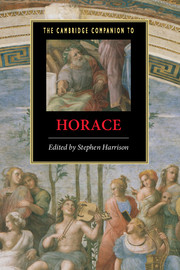Book contents
- Frontmatter
- Introduction
- Part 1: Orientations
- Part 2: Poetic Genres
- Part 3: Poetic Themes
- 12 Philosophy and ethics
- 13 Gods and religion
- 14 Friendship, patronage and Horatian sociopoetics
- 15 Wine and the symposium
- 16 Erotics and gender
- 17 Town and country
- 18 Poetics and literary criticism
- 19 Style and poetic texture
- Part 4: Receptions
- Dateline of works and major political events
- Works cited
- Index
15 - Wine and the symposium
from Part 3: - Poetic Themes
Published online by Cambridge University Press: 28 May 2007
- Frontmatter
- Introduction
- Part 1: Orientations
- Part 2: Poetic Genres
- Part 3: Poetic Themes
- 12 Philosophy and ethics
- 13 Gods and religion
- 14 Friendship, patronage and Horatian sociopoetics
- 15 Wine and the symposium
- 16 Erotics and gender
- 17 Town and country
- 18 Poetics and literary criticism
- 19 Style and poetic texture
- Part 4: Receptions
- Dateline of works and major political events
- Works cited
- Index
Summary
The topic of 'Wine and the symposium' constitutes a major preoccupation of Horace’s poetry from the early Epodes to the late Epistles. It is therefore crucial to an understanding of his underlying system of values. The main focus of this condensed treatment will be on the Odes, with occasional glances at pertinent passages from the Epistles. Since wine is seldom mentioned in Horace’s lyric corpus outside of the context of the symposium, the convivial odes will receive prime attention in what follows.
Before summarising the typical content and structure of the Symposium Ode, it is useful to consider the arrangement of the poems with respect to the theme of wine-drinking. The collection of odes in Book 1 is framed by opening and closing poems that give prominence to the leitmotif of wine. Thus the dedicatory poem to his patron, Maecenas (Odes 1.1), which presents the programme of the Odes as a whole, takes the rhetorical form of a priamel in which the climactic term features the poet-speaker’s choice of a Dionysian community of Nymphs and Satyrs dancing and singing together in a sacred grove and crowned with ivy (29-34). The main vocation championed by the speaker is the composition of lyric poetry in the tradition of Archaic Greek (Lesbian) lyric, but the setting is consonant with the sympotic muse, since the presence of the Bacchic entourage is hardly conceivable without wine-induced ekstasis.
- Type
- Chapter
- Information
- The Cambridge Companion to Horace , pp. 207 - 220Publisher: Cambridge University PressPrint publication year: 2007
- 6
- Cited by

